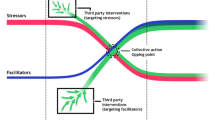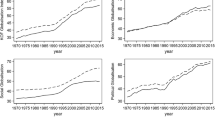Abstract
We examine the ability of focal points to transform situations of potential conflict into situations of cooperation. In performing this function, focal points convert “worst-case scenarios” into “better-case scenarios,” which are easier for political economic systems to handle. Focal points thus contribute to the ability of political economies to perform well in the face of less than ideal conditions, enhancing systemic robustness.
Similar content being viewed by others
References
Benson, B. (1989). “The Spontaneous Evolution of Commercial Law.” Southern Economic Journal 55, 644–661.
Boettke, P. J. and C. J. Coyne (2004). “An Entrepreneurial Theory of Social and Cultural Change.” Mimeo.
Boettke, P. J and P. T. Leeson (2004). “Liberalism, Socialism, and Robust Political Economy.” Journal of Markets and Morality 7, 99–111.
Boettke, P. J. and P. T. Leeson (2006). “Liberal Tolerance as Robust Political Economy.” In: Moreno-Riano, G. (Ed.) Tolerance in the 21st Century: Prospects and Challenges, forthcoming. Lanham: Lexington Books.
Clay, K. (1997). “Trade without Law: Private-Order Institutions in Mexican California.” Journal of Law, Economics, and Organization 13, 202–231.
Crawford, V. (1991). “An ‘Evolutionary’ Interpretation of Van Huyck, Batallio, and Beil's Experimental Results on Coordination.” Games and Economic Behavior 3, 25–59.
Ellickson, R. (1991). “Order without Law: How Neighbors Settle Disputes.” Cambridge: Harvard University Press.
Ellison, G. (1993). “Learning, Local Interaction, and Coordination.” Econometrica 61, 1047–1071.
Farrell, J. (1987). “Cheap Talk, Coordination, and Entry.” Rand Journal of Economics 18, 34–39.
Friedman, D. (1994). “A Positive Account of Property Rights.” Social Philosophy and Policy 11(2), 1–16.
Gambetta, D. (Ed.) (1988). “Trust: Making and Breaking Cooperative Relations.” New York: Basil Blackwell Ltd.
Greif, A. (1989). “Reputation and Coalitions in Medieval Trade: Evidence on the Maghribi Traders.” Journal of Economic History 49, 857–882.
Greif, A. (1993). “Contract Enforceability and Economic Institutions in Early Trade: The Maghribi Traders' Coalition.” American Economic Review 83, 525–548.
Greif, A. (2002). “Institutions and Impersonal Exchange: From Communal to Individual Responsibility.” Journal of Institutional and Theoretical Economics 158, 168–204.
Greif, A., P. Milgrom, and B. Weingast (1994). “Coordination, Commitment, and Enforcement: The Case of the Merchant Guild.” Journal of Political Economy 102, 745–776.
Hampton, J. (1986). “Hobbes and the Social Contract Tradition.” New York: Cambridge University Press.
Hardin, R. (1991). “Hobbesian Political Order.” Political Theory 19, 156–80.
Hardin, R. (1995). “One For All: The Logic of Group Conflict.” New Jersey: Princeton University Press.
Hardin, R. (1999). “Liberalism, Constitutionalism, and Democracy.” Oxford: Oxford University Press.
Hume, D. [1739] (2000). “A Treatise of Human Nature.” Oxford: Oxford University Press.
Kandori, M., G. Mailath and R. Rob (1993). “Learning, Mutation, and Long Run Equilibria in Games.” Econometrica 61, 29–56.
Kavka, G. (1986). “Hobbesian Moral and Political Theory.” Princeton: Princeton University Press.
Klein, D. (1997). “Convention, Social Order, and the Two Coordinations.” Constitutional Political Economy 8, 319–335.
Landa, J. (1994). “Trust, Ethnicity, and Identity.” Ann Arbor: University of Michigan Press.
Leeson, P. T. (2003). “Contracts without Government.” Journal of Private Enterprise 18, 35–54.
Leeson, P. T. (2005a). “Cooperation and Conflict: Evidence on Self-Enforcing Arrangements and Heterogeneous Groups.” American Journal of Economics and Sociology forthcoming.
Leeson, P. T. (2005b). “Endogenizing Fractionalization.” Journal of Institutional Economics 1, 75–98.
Leeson, P. T. (2005c). “Social Distance and Self-Enforcing Exchange.” Mimeo.
Leeson, P. T. (2006). “Trading with Bandits.” Journal of Law and Economics, forthcoming.
Leeson, P. T. and E. Stringham (2005). “Is Government Inevitable?” Independent Review 9, 543–549.
Lewis, D. (1974). “Convention: A Philosophical Study.” MA: Harvard University Press.
Milgrom, P., D. North, and B. Weingast (1990). “The Role of Institutions in the Revival of Trade: The Medieval Law Merchant, Private Judges, and the Champagne Fairs.” Economics and Politics 1, 1–23.
Schelling, T. (1960). “The Strategy of Conflict.” New York: Oxford University Press.
Seabright, P. (2004). “The Company of Strangers: A Natural History of Economic Life.” New Jersey: Princeton University Press.
Young, H. P. (1993). “The Evolution of Conventions.” Econometrica 61, 57–84.
Zerbe, R. and L. Anderson (2001). “Culture and Fairness in the Development of Institutions in the California Gold Fields.” Journal of Economic History 61, 114–143.
Author information
Authors and Affiliations
Corresponding author
Additional information
JEL Code P0
Rights and permissions
About this article
Cite this article
Leeson, P.T., Coyne, C.J. & Boettke, P.J. Converting social conflict: Focal points and the evolution of cooperation. Rev Austrian Econ 19, 137–147 (2006). https://doi.org/10.1007/s11138-006-7345-4
Issue Date:
DOI: https://doi.org/10.1007/s11138-006-7345-4




